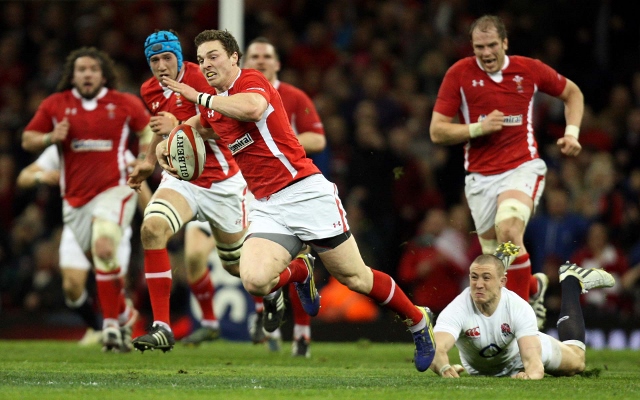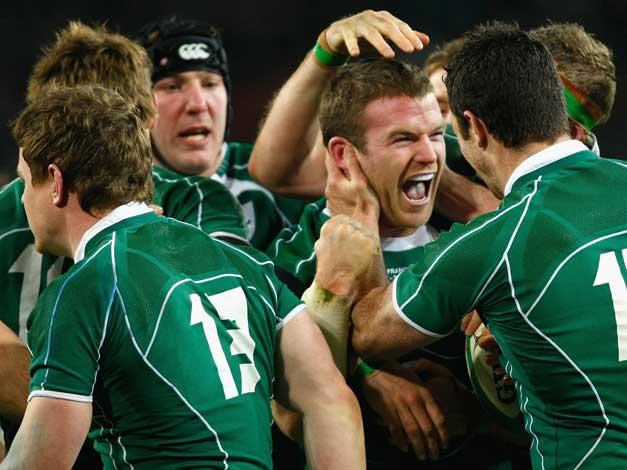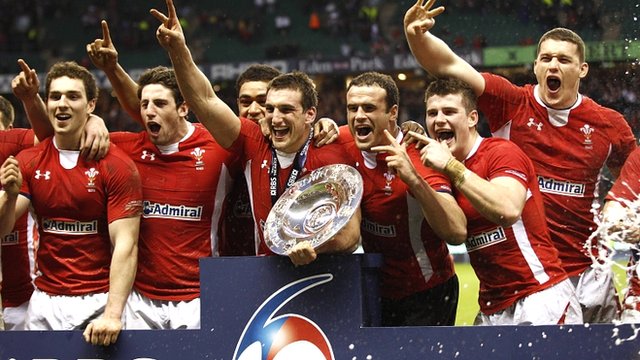Neil Barrett | Contributing Writer
Games between Ireland and Wales have been characterised by unpredictability in recent years, and, paradoxically, the away team have generally won this match over the last three decades. This makes the predictions game even more difficult than usual.
Much of the build-up has focused on Warren Gatland’s infamous decision to drop Brian O’Driscoll for the final Lions Test against Australia last Summer. O’Driscoll has made his frustration known at this carry-on and thankfully, this particular match needs no constructed pretexts to spice it up.
Wales were very unconvincing in lumbering to a home win against Italy last week, and in a competition where points difference is often crucial in determining the winner, their unimpressive 8-point margin of victory may already have cost them a championship. That being said, an extra week together in camp and a boot up the arse from Gattie mean that a very different animal will take to the field in Dublin on Saturday. Due to the Ireland-Scotland match being played on Sunday, Wales are also afforded the luxury of an extra day’s recovery, something which can make a huge difference in the brutal arena of international rugby.
Wales are ravaged with injuries/suspensions in the second-row, but aside from that arrive with a fairly clean bill of health in welcoming back captain Sam Warburton to the starting XV. Ireland should also welcome back their own captain, Munster’s inspirational totem pole Paul O’Connell, as he battles a bad chest infection. Scott Williams, the man who comes in for the injured Davies at 13, is renowned for his pace and outside break but lacks the crunching physicality of the man he replaces.
The physical potency of the Welsh backline is well known, with Jamie Roberts, George North and Alex Cuthbert all 6’4” or taller and weighing in at around 110 kg each. They are no mere bosh merchants, as allied to this sheer mass they are also remarkably fast and technically able. The Welsh backs bullied their smaller Irish counterparts last time out in Dublin in 2012, as they did in the 2011 World Cup quarter-final. The Irish backline must defend aggressively, pushing up hard in a straight line to prevent their enormous opponents from building up any momentum. They must tackle low and hard, as tackling high will only result in them bouncing off their gargantuan Celtic cousins.
The Irish forwards must also work very hard to slow down Welsh ball at the breakdown, as any fast ball will allow the aforementioned giant trio to thunder towards the gainline. If their ball is slowed down, the Irish defensive line will have more time to set itself and the Welsh backs will not be able to run on to the ball with any great speed. However, the Irish pack must also endeavour to make their slowing down of Welsh ball legal, as any penalties conceded in their own half will almost definitely result in the concession of 3 points, such is the range and metronomic accuracy of Leigh Halfpenny’s boot.
Ireland can win by targeting the Welsh pack, as it looks at its most vulnerable in years. At tighthead, the venerable ‘hair bear’ Adam Jones does not look the player of old, as he was given a hard time last week against an Italian scrum which itself has declined notably. Pertinently, Ireland’s novice substitute loosehead Jack McGrath gave Jones a torrid time when Leinster played the Ospreys in September. Gethin Jenkins also comes back in at loosehead prop, but will be rusty as he has only just returned from injury. Like Jones on the other side of the scrum, he is no longer at the peak of his powers, having struggled at Toulon last season and at Cardiff Blues now. With the beastly Cian Healy back in harness and the Irish scrum having gotten the better of its Scottish counterpart last week, Ireland can target the Welsh scrum in a way that would have been unthinkable just a couple of seasons ago. Hooker Rory Best’s breakdown nous cancels out opposite number Hibbard’s superior physicality, and even with Mike Ross in uninspiring form, Ireland shade the battle of the front-rows.
Alun-Wyn Jones is a classy operator but he remains slightly behind Paul O’Connell in the pantheon of the great second-rows. Jones’ partner in the engine room, Andrew Coombs, is a converted flanker and is lightweight at this level. At 6’4” and 108 kg, he’s good in the loose but is just too small to be a truly effective second-row in the test match arena. By contrast, Leinster will have 6’11” tall, 125 kg Devin Toner pushing behind his props. Ireland should also win the battle of the second-rows then.
In the backrow, Welsh captain Warburton’s class is unquestionable but his form has been unconvincing for the last year or so, and this is his first start since recently returning from injury. Their imposing blindside, Dan Lydiate, has been an utter flop for Racing Métro in France and appears to have declined permanently due to a succession of injury problems. Toby Faletau at No.8 is extremely mobile and consequently very dangerous, but he is Wales’ only in-form backrow, and lacks the experience and big-game mentality of Jamie Heaslip. Chris Henry is in the form of his life for Ulster, having played a key role in them being the only undefeated side left in this season’s Heineken Cup. Don’t be surprised to see him give his much-vaunted opposite number a good tussle at the breakdown. On the blindside, Peter O’Mahony bristles with aggression and intensity, the antithesis of his more plodding, static opposite number. Ireland shade the battle of the back-rows then, and the overall battle of the packs.
Ireland also have better half-backs. At scrum-half, Mike Phillips was recently sacked by his club Bayonne for unprofessional conduct and has been visibly off the pace physically in recent months, as well as kicking poorly. He is a shadow of his former self. Conor Murray, meanwhile, has dramatically improving his kicking game and the speed of his delivery.
At out-half, Jonny Sexton is the undisputed best in Europe while Wales’ Rhys Priestland looks as error-prone and callow as ever. His low-trajectory kicks are also particularly vulnerable to chargedowns. If he makes early mistakes, he can crumple under the pressure.
Wales have a more dangerous backline but with O’Driscoll’s defensive brilliance and Ireland’s obvious superiority in the half-backs, Ireland have the ability to strangle the life out of Wales with an effective kicking game. The Welsh pack are vulnerable and Ireland’s is in rude health. Ireland can dominate the four major areas of forward play – the breakdown, scrum, line-out and tackle. With this forward dominance comes a good platform for the Irish backs, and crucially, slower ball for Wales, consequently neutering their highly dangerous backline. Add in Ireland’s superior 9-10 combination and consequent better kicking game, and Ireland can control this fixture. Despite all of this, Wales’ individual brilliance must count for something, meaning it will never be comfortable for Ireland. Prediction: Ireland by two scores.









